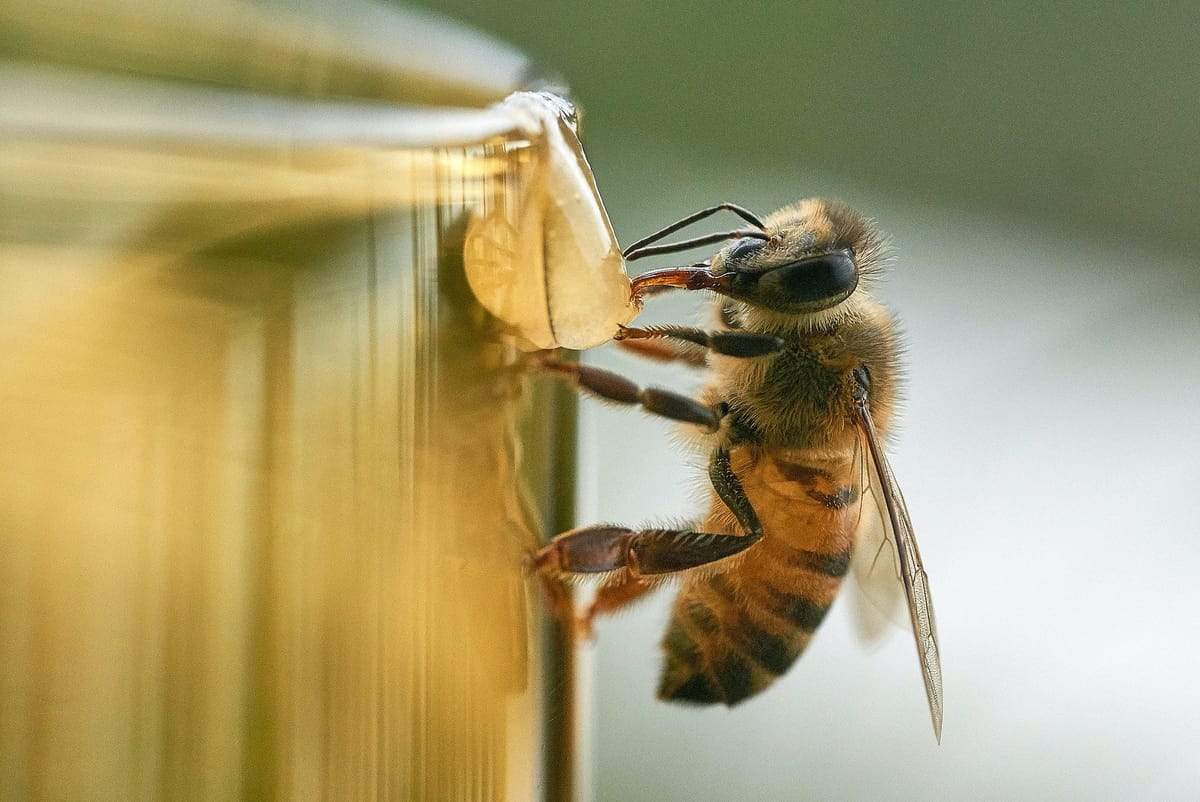Bees and Honey and What We Can Learn From Bees
Bees give so much to us, and it is our responsibility as consumers of honey to ensure that we educate ourselves and others on their conservation and overall environmental conservation.

Bees are a marvel to the world and are at the forefront of ensuring that our world remains colorful and beautiful. Without bees, we would not have honey, and people would probably call their partners sugar or something less sweet.
The Importance of Bees to the Ecosystem
Bees are a crucial part of all ecosystems as they undertake the pivotal role of pollination and ensuring that pollen from particular flowers gets to other flowers. It instigates the reproductive process, and the flowers can bloom and produce seeds and other flowers. The cycle of life for plants depends on pollinators such as bees, birds, and others. Bees allow flowers the world over to bloom and do it while producing the superfood that is honey.
Honey and How Its Sweetness is Made of Love
Honey is a gift of mother nature to us and is very nutritious as part of the dietary facilitations that we, as the human species, get afforded by nature and bees. Bees make their honey from the sweet nectar that they source from flowers, and I think it is safe to say that honey is very much a flower sauce. I love flowers, and I am sure most of us have one flower or the other that we adore.
Bees share this love and ensure that they can assist flowers and other plants to start fertilization and then seed production. They work along with other pollinators, including the wind, to ensure that pollen gets transported from the female part to the male part of the plant. In this light, bees allow for connection and life. Bees are a link between plants allowing for reproduction and the flourishing of these plants.
What We Can Learn from Bees: Work Ethic
Bees are very hardworking, and for us as human beings, hard work is one of the biggest lessons that we can learn from bees. They toil and toil as much as they can to ensure that the process of life continues and that they make honey. Honey is food for the bees. It is stored to facilitate seasons when not so many or any flowers are blooming, such as winter.
Ensuring Bees' Well-being in Cold Months
In this light, taking honey from bees could curtail their well-being in cold months or months when there are fewer flowers. As such, it is crucial that honey harvesting gets done responsibly and sustainably. An excellent way to do it is to harvest it while it is still fluid, and when it has not become too thick to harvest. It should be in open wax or uncapped, and the farmer should ensure that they are aware of the various seasons and nectar flows.
The Importance of Nectar to Bees and Honey
Irresponsible agriculture or the proliferation of the use of artificial pesticides is a risk to the well-being and existence of bees and other insects. Arable land depends heavily on the ecosystem, and insects are a huge part of the ecosystem and the fruition of plants and flowers. Bees especially are dependent on the nectar that they get from flowers to make honey that they will rely on when it's cold and flowers are fewer.
What Types of Bees Produce Honey?
Honey bees are the only ones that produce honey, and bees such as bumblebees do not produce honey but only go out to source nectar. Bees live in colonies that comprise a queen, several hundred drones, and thousands of female worker bees. The drones only have the single job of mating with an unfertilized queen, while the female bees are the ones responsible for gathering nectar and transporting pollen.
Bees are attracted to flowers for their nectar.
The Strength of Bees and What We Can Learn From It
Characteristically, bees also show us the power and strength of the female persona as the females are the ones who undertake the tough job of gathering nectar and pollen and feeding the larvae in the hive.
The Role of the Queen Bee
The queen bee is the only bee in the colony with fully developed ovaries and is the mother of most, if not all, of the bees in the colony. She lays eggs and is not very much a decision-maker. She is larger than all the other bees and is central to the survival of the colony. She is essentially the reproduction powerhouse of the colony.
The Dedication of Worker Bees and The Social Structure of Bees
Worker bees are more the decision-makers and have the power to raise a new queen or replace the existing one. ‘Replacement’ happens when the worker bees kill the queen. The social structures of bees are somewhat very characteristic of what we today understand and appreciate as hierarchy and central figures. In comparison, the bee colony can become said to be similar to an empire. It is quite a coincidence that colonies are called ‘colonies’ and are similar to the empire’s way of governance.
The Role of Bees in Pollination and Its Importance
Bees are essentially very determined in their role and the place they hold in an ecosystem. They ensure that they do their part and see to the fertilization of flowers and plants and the production of seeds. Bees, therefore, allow for continuity and interface a generation of plants with the next generation. It shows their transitory nature and the integral role they play as a bridge or channel between the male and female parts of a plant.
Bees, like all insects, require a healthy ecosystem to flourish. When climate change or human activity leads to unfavorable conditions, they will mostly die, and the effect on that particular ecosystem is massive. When the plants can no longer rely on bees and other insects to pollinate, it means that only winds and pollinators such as birds can facilitate this crucial process. Unfortunately, when these lack or when birds can no longer bear the adverse effects of a particular ecosystem, plants, and flowers may end up wilting.
How Bees Help Grow Fruits and Vegetables
We enjoy fruits and vegetables and numerous other plants due to the pollination that bees and other insects facilitate. Flowers produce nectar and are beautiful to attract bees. In the process of acquiring the nectar, pollen sticks on the hairy bees’ legs and in some species, can be collected in pollen baskets which are opening on their legs for collecting pollen. When the bees move from a single plant to the other, they carry this pollen with them and facilitate pollination.
We need to ensure that we do our best as humans to protect bees and other pollinators as a way to ensure continuity and longevity in our ecosystems. We love fruits and vegetables, and it would be unimaginable to live in a world without them. Flowers also beautify our environment and have sentimental and aesthetic value in our lives. We also share flowers with those we love as a way to show appreciation, and I would not imagine anything else more proper than flowers.
How Bees Color Our Lives
Our color palates and the outlook we have of the world would be completely different if we did not get a chance to see beautiful flowers and the beauty of nature. Even when it comes to mental health, flowers have a calming effect and can reduce stress. In terms of interior decor, furnishings, and outdoor living, flowers are a significant part of the design and the various ways spaces can get made to feel warm and aesthetically pleasing.
Having plants and flowers in a space can also ensure that there is a reasonable exchange of oxygen and carbon dioxide as plants take in CO2 and give out oxygen. When one has an open space that they’d love to transform, plants can be effective in bringing nature indoors. Plants take up oxygen at night, and it is not advisable to have plants overrun a bedroom or enclosed space. Due to a lack of sunlight to facilitate photosynthesis at night, plants will not produce oxygen but CO2 instead. Some species, however, can produce oxygen at night and as long as a room is well-ventilated, there is no major effect.
Would you keep a plant indoors? What type of plant?
The Intersection of Nature and Health
Plants are part of natural healing, and tending to and taking care of them can be therapeutic. Those of us who are enthusiasts of farming or having a kitchen garden or family farm can aspire to own a garden where we can grow flowers and farm bees. Bee farming or beekeeping and having a flower or botany can complement each other.
Growing Plants as a Hobby
Plantlife is very much a part of the hobbies or passions one can have and can help the individual connect with nature. Even with limited space, the individual can even have a greenhouse, however small, where they can grow their own fruits and vegetables. It would be a way to move away from consumerism and mass-produced fruits and vegetables. It would also allow the individual only to consume organic products.
The Importance of Organic Products and How they Help Bolster Health
Organic products have become recommended as they get produced sustainably and organically, where there are no artificial chemicals or inputs, including fertilizers, that go into the production of fruits and vegetables. Organic farming is very much an integral way to protect our ecosystems and to ensure that bees and other insects flourish.
The Importance of Organic Farming to the Food Chain
It also ensures that the food chain remains intact and that no species is either wiped off or becomes overpopulated. It ensures that there is a balance between producers and consumers and also between primary and secondary producers or consumers. Such protection would ensure there is a balance in the ecosystem and that all members of the food chain remain protected.
The Conservation of Bees and How We Can Take Part in It
Bees give so much to us, and it is our responsibility as consumers of honey to ensure that we educate ourselves and others on their conservation and overall environmental conservation. Bee farming can also be something that one undertakes as a way to complement their income. Here in Africa, beekeeping gets appreciated as practical. Even with a small parcel of land, one can effectively farm bees. Interested individuals should, however, conduct adequate research on the best practices in beekeeping.
Why the Ecosystem is Important and How We Can Help
The ecosystem is very crucial, and bees have a vital role in ecosystems. Bees also have numerous lessons to teach us, such as bravery, hard work, work ethic, and dedication. Bees are brave and always in control of what they do. They effectively protect their space and what they have and make. It is an inspiration to us to not only work hard, but also protect our work, ourselves, and what we have. Additionally, when one gets into what they love as part of hustle and ensure that they stay as busy as a bee, they can allow for motivation and success.





